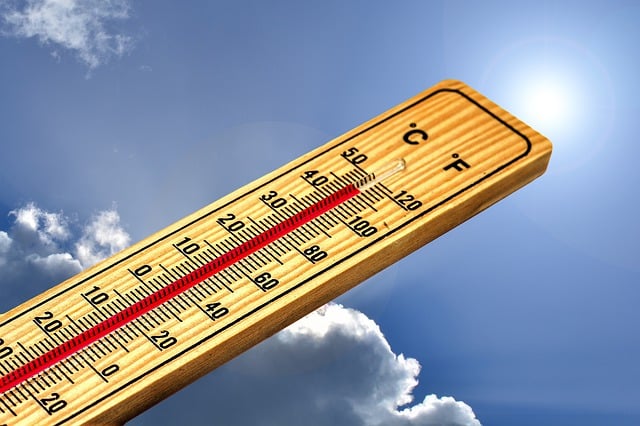Share This Article:

Climate & Comp
Dallas, TX (WorkersCompensation.com) – Two years after USPS letter carrier Eugene Gates, Jr. died of heat-related illness, another Dallas postal worker has died.
Labor advocates and others are asking Congress to push for worker protections as a heat dome covers the eastern half of the United States and forecasters predict hotter than average temperatures throughout the country this summer.
On Tuesday, Brian Renfroe, president of the National Association of Letter Carriers, said Jacob Taylor, a Dallas USPS worker, died Saturday. While his death remains under investigation, some suspect he died of heat exposure on a day when temperatures reached into the 90s.
"It's of course a heartbreaking loss that serves as another jarring reminder of the on-the-job hazards that letter carriers face every day, such as crime, assaults, extreme heat and dealing with problems with infrastructure such as outdated vehicles," Renfroe said, as he testified before the U.S. House Committee on Oversight.
Renfroe said Taylor was 51 years old and that the circumstances of his death are still under review.
Kimetra Lewis, president of the Dallas branch of the National Association of Letter Carriers, said Taylor had worked for the USPS for 28 years and had fallen ill that afternoon. She confirmed that Taylor was given CPR at the scene but was not resuscitated.
A witness to the incident posted a video to TikTok showing a significant emergency response to the scene.
“This man was passed out in the van … they were trying to resuscitate this man,” the woman, whose name on the app is listed as Elle, said in the video. “It feels like 103 degrees today. Why aren’t we taking care of our postal service workers?”
His death comes near the two-year anniversary of the death of another postal worker in Dallas. Gates collapsed on the job on June 20, 2023. His cause of death was determined to be heat and heart disease. OSHA fined the USPS more than $15,600 for failing to protect mail carriers from heat exposure on the job.
Since 2023, the postal service has been working to modernize mail vehicles in Texas to include air conditioning. Most mail carrier vehicles owned by the postal service do not have air conditioning.
“If you’re not giving them the resources to do [their job] safely, it doesn’t matter,” Elle said at the end of her TikTok video. “These are people, too.”
Labor activists are calling for immediate action to protect workers from high temperatures on summer days.
Last year, the Biden administration issued a draft rule protecting workers from heat. Federal officials said that in 2023, 55 workers died of heat-related causes, up from 43 in 2022, and 36 in 2021. Between 2011 and 2022, nearly 500 workers died of exposure to heat and some 34,000 suffered heat-related illnesses and injuries, according to the U.S. Bureau of Labor Statistics. Officials said those numbers are likely to be vastly under-reported.
And the summers are continuing to get warmer.
On Monday, OSHA began hearings on the Biden administration’s draft rule. The rule would require employers to create a plan to evaluate and manage workplace heat and to provide workers with cooling areas to rest on hot days and plenty of water. Officials have previously said it will likely take several years before OSHA can finalize any worker protection rules related to the heat.
In the meantime, things are only getting hotter. Last year, according to the National Weather Service, was the hottest on record, and this year’s projections put temperatures above last years.
At a rally for heat justice in Washington, D.C. on June 24, U.S. Sen. Ed Markey (D-Mass.) said this year is looking to be deadly for outdoor workers, but that the impact won’t be felt by all workers equally.
“The impact of extreme heat might not be equal, but the solution should be that every worker should clock into work knowing they will return home safely at the end of their shift,” he said.
Getting to a safe heat standard should be a priority, he said.
“To anyone who says we should not have the strongest possible standards to protect workers from extreme heat, consider this,” he said. “The worker harvesting crops in the sweltering heat without water or access to emergency medical care, the delivery worker who collapses on your front step or unconsciously swerves into you on the road because they are forced to drive without air conditioning, and the construction worker who dies of heat stroke because they were not provided shade or breaks. Not one single worker’s life or health is worth the risk of scaling back these regulations.”
AI california case file caselaw case management case management focus claims compensability compliance compliance corner courts covid do you know the rule employers exclusive remedy florida glossary check Healthcare hr homeroom insurance insurers iowa leadership medical NCCI new jersey new york ohio pennsylvania roadmap Safety safety at work state info tech technology violence WDYT west virginia what do you think women's history women's history month workers' comp 101 workers' recovery Workplace Safety Workplace Violence
Read Also
About The Author
About The Author
-
Liz Carey
Liz Carey has worked as a writer, reporter and editor for nearly 25 years. First, as an investigative reporter for Gannett and later as the Vice President of a local Chamber of Commerce, Carey has covered everything from local government to the statehouse to the aerospace industry. Her work as a reporter, as well as her work in the community, have led her to become an advocate for the working poor, as well as the small business owner.
Read More
- Mar 01, 2026
- Chris Parker
- Mar 01, 2026
- Frank Ferreri
- Feb 28, 2026
- Chriss Swaney
- Feb 28, 2026
- Chris Parker
- Feb 28, 2026
- Chris Parker
- Feb 27, 2026
- Liz Carey




